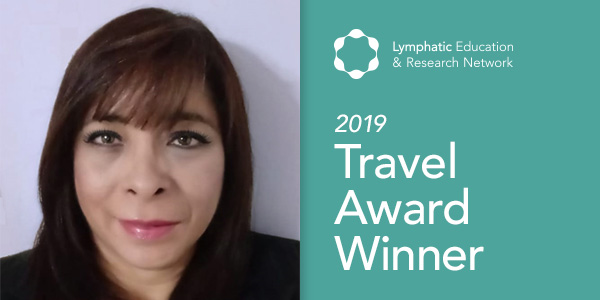Glicella Salazar-De Simone, Ph.D., currently a postdoctoral research scientist at Columbia University, under the supervision of Carrie Shawber Ph.D., received a Travel Award and a Top Poster Award from LE&RN to attend the 2019 Lymphatic Forum in Austin, TX. We asked Glicella to share her thoughts on that experience with us and to tell us a bit about her research and future plans.
What did you get out of the Lymphatic Forum? Why did you feel it was important to attend?
I would like to express my gratitude to LE&RN for the Travel Award and Top Poster Award. Attending the 2019 Lymphatic Forum not only gave me the opportunity to hear about the cutting-edge work that is being done within the lymphatic field but also allowed me to listen to the patients' perspectives suffering from lymphatic pathologies such as lymphedema. After hearing about their testimonies, it was satisfying to know that with my research I could help in the battle that these patients were facing. At the Poster sessions, I had an invaluable opportunity to present my research in lipedema and received feedback from some of the most influential people in the field. As a young investigator, I appreciated the wide range of topics presented at the conference. Indeed, attending this conference helped me to keep up to date with the current state of research in the field and to gain exposure to new ideas. Additionally, the structure of the conference and its approachable size made it perfect for networking and meeting potential collaborators. This was my first time attending the Lymphatic Forum and it was very informative and inspiring to join forces with LE&RN in the fight for research funding in lymphatic research. Becoming one of the researchers that signed a letter addressed to the Senate requesting an increase in lymphatic research funding inspired me to be more proactive with LE&RN's advocacy efforts.
What are your areas of interest in research?
I am interested in understanding the pathobiology of lipedema and the role of the lymphatics in its development and progression. Currently, I am elucidating the role of lymphatic endothelial NOTCH4 in regulating the subcutaneous adipose tissue deposition.
What are your hopes and plans for your career and your research?
As a career path, I am interested in translational research. I hope to continue doing research in lymphatic pathologies with an emphasis on clinically relevant discoveries. Also, I am very interested in becoming an advocate for those patients suffering from lymphatic diseases. Regarding my current research, I hope that the knowledge gained through a better understanding of the pathobiology of lipedema can lead to improving diagnosis and developing an efficacious treatment for lipedema patients.
Why do you believe that, in general, lymphatic research is important? What might the field accomplish within the next few years?
Although lymphatics are responsible for tissue fluid homeostasis, immune surveillance, and intestinal lipid absorption, for many years they have been relatively understudied. Fortunately, with the identification of several lymphatic-specific markers and the availability of an increasing number of in vivo and in vitro models to study numerous aspects of lymphatic biology, the lymphatic vasculature has become more and more appreciated as a major player in physiological and pathological conditions. For instance, the recent discovery of lymphatic networks in the central nervous system and the heart has led us to rethink the implication of lymphatic system development and diseases. I believe within the next few years we will have a better understanding of the implication of the lymphatic vasculature in disease which in turn will significantly improve the quality of life in all patients. I firmly believe that the emerging importance of the lymphatic vasculature as a therapeutic target will bring more attention to the scientific community.
LE&RN programs, like LE&RN Travel Awards, are only possible because of our Partners and Supporting Members. Become a Supporting Member today.

